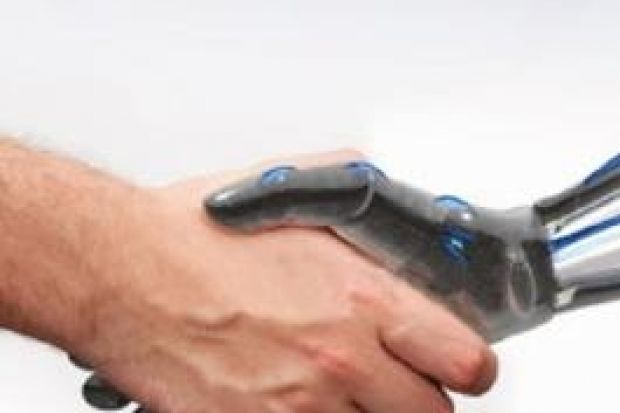When I asked a group of people to describe the mental picture they see when the term "robot" is used, I got an interesting set of responses. The dramatic variety of images seemed to be tied to the age of the respondent, their tastes in literature and drama and - to a lesser extent - their degree of exposure to automated technology. Nevertheless, a clear theme ran through the images - that of the maverick robot breaking free from the constraints of its programming and laying waste to anything in its path.
This image of the robot is deeply engrained in literature and film, from Karel Capek's 1921 play Rossum's Universal Robots through to the burgeoning science-fiction market in bio-engineered killing machines typified by the replicants in the 1982 film Blade Runner.
In this important book, Wendell Wallach and Colin Allen discuss the technical, moral and practical aspects of organising a world where, increasingly, human life is protected and managed by non-human operators. From battlefield weapons to traffic management, ever more sophisticated systems are being employed to manage decisions that involve the taking or saving of human life.
At the simplistic level, it appears a trivial task to provide a computer with a set of instructions to protect human life. After all, Isaac Asimov needed only three (later four) Laws of Robotics to spawn a whole raft of stories. What we tend to forget, however, is that most of Asimov's robot stories are built around the conflicts generated by those laws.
Wallach and Allen illustrate the true complexity of the issue using a classic ethical example - the "trolley case". Imagine a driverless, autonomous tram car on a track. Ahead there is a group of workmen in its path. The tram cannot stop in time, but by switching tracks it will kill only one person. Easy - the robot tram should minimise the loss of life.
But what if the single person is highly skilled, for example a famous concert pianist? What if it is a child that has strayed on to the track? Should the tram kill many workers or one child? Suddenly the proposition has become much more complicated.
Having engaged our attention, the authors give us some current examples of how systems that might share these ethical conflicts are being developed and used. The use of battlefield systems where robots take lethal decisions is still, the authors suggest, some way off - but the deployment of such weapons seems to be almost inevitable.
Systems are, we are told, already in use where targeting is done automatically by largely autonomous military devices, with only the final decision to kill being taken, from a remote location, by the human operator. While deeply chilling in its implications, this discussion brings home to the reader just how much is at stake in the development of "machine ethics".
The bulk of the book introduces a series of concepts around which ethical solutions to these issues could be designed. The arguments are approached openly and clearly, with due deference to the very wide range of readership that this title deserves to attract. Whether you are an ethicist approaching the issues raised by technology, or a systems developer seeking an understanding of ethics without having to reinvent the wheel, the material should present an interesting and challenging view.
As technological solutions become increasingly complex, the study of machine morality will inevitably be of major importance to our future as a society. This book represents a valuable crossover resource that doubtless will be approachable and instructive to a wide range of generalists and specialists.
Fiction has given us many dramatic illustrations of worlds where machine autonomy is unconstrained. Wallach and Allen provide the clear message that existing moral and ethical thought - coupled with innovative technical development - is central to informing and shaping the way we can avoid such nightmares.
Moral Machines: Teaching Robots Right from Wrong
By Wendell Wallach and Colin Allen
Oxford University Press
288pp, £15.99
ISBN 9780195374049
Published 20 November 2008
Register to continue
Why register?
- Registration is free and only takes a moment
- Once registered, you can read 3 articles a month
- Sign up for our newsletter
Subscribe
Or subscribe for unlimited access to:
- Unlimited access to news, views, insights & reviews
- Digital editions
- Digital access to THE’s university and college rankings analysis
Already registered or a current subscriber?
